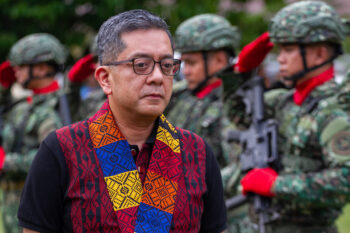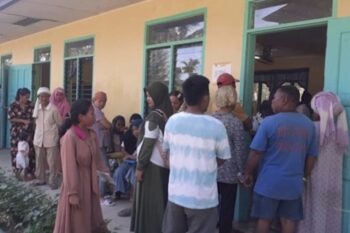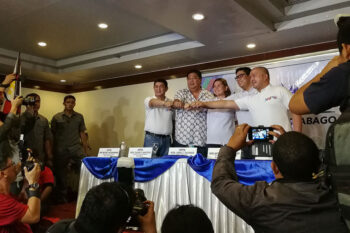GENERAL SANTOS CITY(MindaNews/02 August) – Chairman Nur Misuari has warned anew that the Moro National Liberation Front will declare an independent Bangsamoro Republic. This will happen “once Malacanang ends the 1996 final peace accord with the MNLF and adopts the framework agreement for Bangsamoro [FAB] with the Moro Islamic Liberation Front”, The Philippine Star reported (July 26: “Draft Bangsamoro constitution to be presented in ‘Independence Assembly).
Starting last Sunday, July 28, from General Santos City and on to other places, the MNLF would convene its members as “Independence Assembly” to present the draft of the Bangsamoro constitution. Unless clarified otherwise, “MNLF” is the Misuari faction.
The report quoted Misuari telling reporters that the Philippine government has proposed to the OIC [then Organization of Islamic Conference (now, Cooperation)] “the closure of our peace process” — referring to the six-year OIC-GRP-MNLF tripartite review of the implementation of the 1996 Final Peace Agreement. With the closure, he said the “Philippine Government will do away with the series of peace treaty agreements and peace accords that we have signed over a number of decades”.
Secretary Teresita Quintos-Deles, presidential adviser for the peace process, in a statement from Jakarta, Indonesia last July 26 after meeting in the morning of the same day Indonesian Minister of Foreign Affairs Marty Natalegawa, confirmed the proposal to close the tripartite review, “not the closure of the peace process nor the abrogation of the 1996 Final Peace Agreement”.
This was posted in the website of the OPAPP (Office of the Presidential Adviser on the Peace Process) on the same day which The Philippine Star picked up and reported on July 28 (”Gov’t plans to end review of peace pact with MNLF”). In another report on July 30, The Star said Malacanang has “allayed fears over” Misuari’s threat assuring that all, including Misuari’s MNLF will benefit from the Framework Agreement on Bangsamoro (Palace: Bangsamoro framework deal will benefit all Muslims).
The Past in Capsule
It’s time to end the “review”. Behind all the diplomatic niceties, the review might have been called for but, apparently, it disregarded facts that mattered significantly. Having been proposed by the MNLF through the OIC, the Arroyo government then could not refuse the latter out of some kind of “utang na loob” (debt of gratitude) like a leash.
Agreed! On record, the Philippines owes the OIC a historic favor. On the request of President Ferdinand E. Marcos, the OIC intervened in the Moro Problem, reined the MNLF and in 1974 during its Foreign Ministers Conference in Kuala Lumpur set the parameter of Muslim autonomy “… within the national sovereignty and territorial integrity of the Republic of the Philippines”. This is the autonomy in the 1976 Tripoli Agreement and in the 1996 Jakarta Accord or the 1996 GRP-MNLF Final Peace Agreement.
But should this historic favor also be an unbreakable leash on the Philippines in dealing with the MNLF – disregarding the splintered state of the MNLF now and the leadership stature of the founding Chairman Nur Misuari? Half a century is not too long a time to obscure a debt of gratitude; but it’s long enough to see changes that would reasonably temper, loosen the hold of that debt of gratitude and end it altogether.
During that long a time, the OIC has imposed on the Philippines this diplomatic edict: “The MNLF is the sole representative of the Muslims in Southern Philippines and Chairman Nur Misuari sitting as an observer in the OIC Conference of Foreign Ministers represents the MNLF.” Unto this day the OIC heeds what Misuari says about the state of Muslims in Southern Philippines and the OIC transmits this to the Philippine Government through its yearly ICFM resolutions.
How long will the OIC tie the Philippines onto this edict? How long will the OIC remain blind to the status of Misuari as a Moro leader to complicate the solution of the Moro Problem? By their own fault, the MNLF has become irrelevant to the Moro Problem.
The MNLF rebellion exploded on February 27, 1973. Years before and after that, the MNLF enjoyed the material, moral and diplomatic support of OIC member countries particularly Libya, Saudi Arabia, Pakistan and Malaysia. In December 1976, the Tripoli Agreement (TA) was signed but not implemented. Under President Corazon C. Aquino, a negotiation to implement the TA failed. Under President Fidel V. Ramos, the 1996 GRP-MNLF Peace Agreement was the “final agreement on the implementation of the 1976 Tripoli Agreement”, hence, the “1996 Final Peace Agreement” (1996 FPA).
Call it a bonus. As the Jakarta negotiation was winding up, President Ramos offered the governorship of the Autonomous Region in Muslim Mindanao to Misuari. He accepted it, specially registered as a voter and ran unopposed. The 1996 ARMM election was moved to September 9, seven days after the signing of the FPA.
While the governor of the ARMM, Misuari was chairman of the Southern Philippines Council for Development (SPCPD) and its legislative arm, the Consultative Assembly (CA) that governed the Zone of Peace and Development (ZOPAD). Created by an executive order, SPCPD and CA were the Provisional Government and ZOPAD the area of autonomy delineated in the 1976 Tripoli Agreement.
As agreed (FPA.I.2.a.b.), the Congress had until 1998 to amend or repeal R.A. 6734, the bill to “include pertinent provisions of the Final Peace Agreement and the expansion of the present ARMM area of autonomy”. R.A. 9054, the amendatory act, was enacted in February 2001 and lapsed into law in March. Misuari and the MNLF objected to many of its provisions, accusing the Congress of passing it without consulting them.
The plebiscite to ratify R.A, 9054 and to expand the four-province ARMM under R.A. 6734 was held on August 14, 2001 and the regional election on November 26 over the vehement objections of Misuari and the MNLF and the request of the OIC to postpone the plebiscite and the election – the latter to 2003. Misuari did not run for reelection.
Significant Matters
The tripartite review, opening in November 2007, appeared to be an admission by the Philippine Government that it had wronged the MNLF as complained of concerning the implementation of the 1996 FPA. As it turned out by the end of the Arroyo presidency, the third session in 2010, the review focused on the amendment of R.A. 9054. The technical working groups identified “36 issues” which are the subject of “closure” under the Aquino administration.
Were the complaints of Misuari and the MNLF the proper subjects of a tripartite review? There are significant matters pointing to the impropriety.
First: Misuari and the MNLF accused the Congress of not consulting them during the enactment of R.A. 9054 in violation of the 1996 FPA in letter and spirit.
Part I.2.a. of the FPA states that “… a bill to amend or repeal the R.A. 6734 shall be initiated with Phase I (1996-1997). The bill shall include the pertinent provisions of the Final Peace Agreement and the expansion of the present ARMM area of autonomy” (Emphasis supplied). The FPA gave the Congress the discretion to determine which provisions were “pertinent” – not requiring consultation with Misuari and MNLF or the enactment in toto of the FPA into the amendatory or repealing law.
We have done a provision by provision comparison of R.A. 6734 and the FPA in relation to the substantive provisions of the 1976 Tripoli Agreement; except for a few provisions, the FPA was a rehash of R.A. 6734. Oddly rehashed to amend it! In rehashing RA 6734, the MNLF accepted what it had repeatedly rejected; in amending RA 6734, the Congress only amended its original legislation. What “letter and spirit” did it violate?
[NOTE: If time and resources permit, we will republish the provision by provision comparison of R.A. 6734 and the FPA, the Chapter VII of our book What Ails Muslim Autonomy?, and a similar comparison of R.A. 6734 and R.A. 9054 which we have already outlined. – PPD]
Second: In convening the tripartite review, the OIC acted in disregard of the FPA and its own resolution.
Part II.12 of the FPA states: “The OIC shall be requested to continue to extend its assistance and good offices in monitoring the full implementation of this agreement during the transitional period until the regular autonomous government is firmly established …”
In its 31st ICFM Resolution 2/31-MM in 2004, the OIC recognized the plebiscite as a “significant” development “in the implementation of the 1996 Peace Agreement” which its 32nd ICFM reiterated in 2005. The same recognition the 10th Islamic Summit did in 2003. By these recognitions, Part II, Paragraph 12 of the 1996 FPA had been positively fulfilled and had become inoperative.
Third: Misuari and the MNLF were inconsistent in persistently complaining to the OIC.
They cited as a violation of the FPA the two-question plebiscite – one question asking the four ARMM provinces to ratify R.A. 9054; the other asking the other provinces and included cities in the area of the autonomy that had opted out of the ARMM in 1989 if they would join the “expanded ARMM”.
What does the FPA provide?
In I.2, “… the amendatory law shall be submitted to the people of the concerned areas in a plebiscite to determine the establishment of a new autonomous government and the specific area of autonomy thereof.” In I.2.a., “… it shall be submitted to the people for approval in a plebiscite in the affected areas …” In I.2.b., “The new area of autonomy shall then be determined by the provinces and cities that will vote/choose to join said autonomy (1998).” (Underscoring supplied).
The Congress did as the FPA provided: One question to “vote/choose” in order “to determine” the expanded ARMM and another question “for approval” of R.A. 9054.
But Misuari and the MNLF contended that was not the intent of the FPA. They wanted the two questions for all, rejecting the explanation that the four ARMM provinces did not have to “choose to join” but only “approve” since they already composed the ARMM and only the non-ARMM provinces and included cities had to “choose to join or not” without approving R.A. 9054.
Did the MNLF really reject the results of the plebiscite?
Only Misuari and his faction objected to the November 26, 2001 ARMM election – in fact, violently. Dr. Parouk Hussin of the MNLF Executive Committee of the 15 was elected governor under the administration party; his MNLF faction dominated the Legislative Assembly. Losing President Arroyo’s support, Hussin lost in the 2005 election. Hatimil Hassan of Basilan was the only MNLF reelected member of the Legislative Assembly.
By participating in the 2001 and 2005 ARMM election, especially running for the top post and the Legislative Assembly, the MNLF Executive Committee of the 15 had accepted the plebiscite. In fact, Misuari and his faction accepted the plebiscite when they recognized R.A. 9054 for amendment.
It was after they had lost power that they intensified their complaint with the OIC.
Fourth: The tripartite review could have been avoided.
As known from reports in 2012 coming from OPAPP, the media and the MNLF website, a bill to amend R.A. 9054 was being drafted. If so, the tripartite review has been doing what the Legislative Assembly under Governor Hussin ( November 2001 – August 2005) could have or should have done according to Article XVII, Section 2 of R.A. 9054.
The MNLF-controlled 2001-2005 Legislative Assembly had the power to submit to the Congress amendments to R.A. 9054 to correct the alleged wrong implementation of the FPA. Oddly, the MNLF defaulted; then, after losing power, they complained to the OIC asking the Islamic body to intercede to do what they should have done while in power.
The Arroyo government could have – but it did not – attended to the MNLF complaints and asked the Legislative Assembly in 2006 to study together with the MNLF how R.A. 9054 might have been amended in relation to the implementation of the FPA as being complained of. That could have preempted the OIC intervention.
Power and Subservience
Ignored, the MNLF nagged the OIC with the same litany of complaints they had given the Arroyo government in the name of the Moro people. The MNLF knew this: The Philippine government could ignore them but not the OIC.
President Arroyo could have said no to the tripartite review. She did not. She should have asked the OIC on what basis Misuari and the MNLF were to negotiate with the Philippine government considering the realities:
(1) That Misuari and the MNLF, having pledged allegiance to the Philippine flag and the Constitution, were no longer rebels.
(2) That the Bangsamoro people had voted to reject their leadership.
(3) That the badly splintered MNLF is the sole representative of the Muslims in Southern Philippines had become a myth.
Stripped of all diplomatic niceties and pretensions, the tripartite review was really an imposition by the “powerful” OIC to the “subservient” Arroyo government. The review was OIC-controlled. The five committees tasked with the review were composed of the Philippine and MNLF panels with their respective chairs but they were under the OIC overall chairs. And, the committee reports were submitted to the OIC for review.
The Aquino III government had no choice but to continue the review to its completion. That is what it is doing now according to Secretary Deles. But that is not an easy task: How to complete and close the review to boost the peace process under the FAB instead of derailing it and to end Philippine diplomatic subservience to the OIC. (“Comment” is Mr. Patricio P. Diaz’ column for MindaViews, the opinion section of MindaNews. The Titus Brandsma Media Awards honored Mr. Diaz with a “Lifetime Achievement Award” for his “commitment to education and public information to Mindanawons as Journalist, Educator and Peace Advocate.” You can reach him at patpdiazgsc@yahoo.com.)







